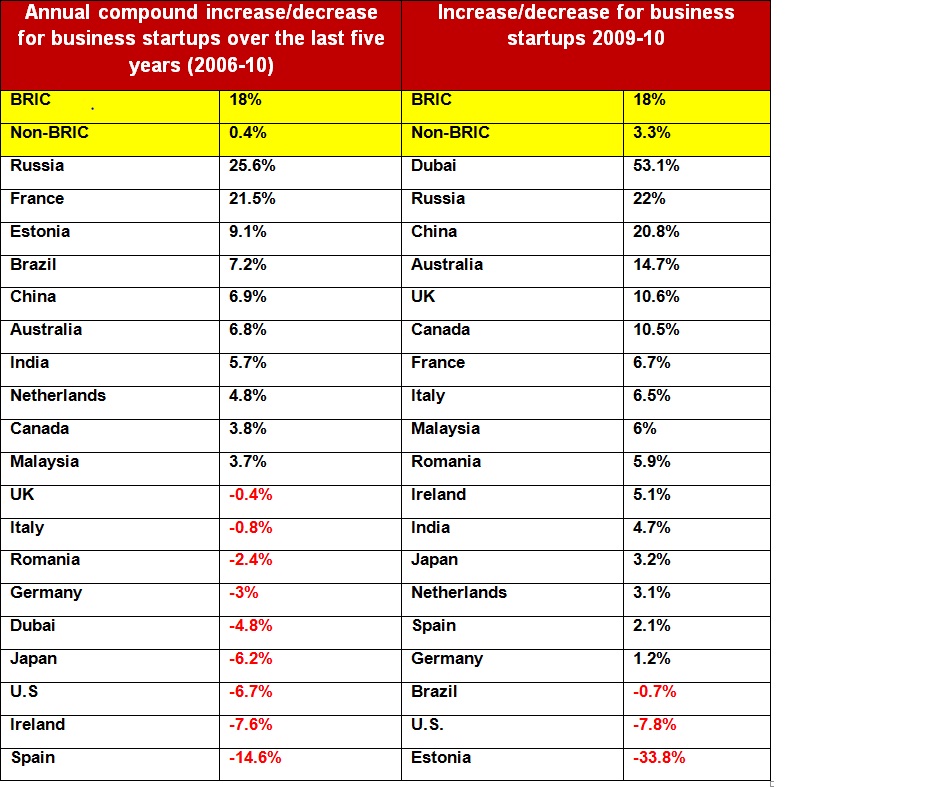The increase in new business startups is now on average 40 times faster in BRIC nations than other countries, according to UHY, the international accounting and consultancy network.
The research shows that BRIC nations are, on average, creating 18% more new businesses per annum compared to non-BRIC nations, which are, on average, creating just 0.4% more new businesses per annum.
UHY professionals studied data on new business registrations over the last five years in 19 countries across its international network, including the G8, as well as key emerging economies, including the BRIC nations (Brazil, Russia, India and China).*
According to UHY professionals, policymakers have been taking measures to encourage greater entrepreneurial activity during the financial crisis, but the research highlights the need for some countries to do more to help new business startups, which in many countries are struggling with low demand and restricted access to bank finance.
While in some countries the number of new businesses being created has increased by double digits over the last five years, in others the number of new business startups has decreased by a double digit percentage.
The country with the fastest increase is Russia, one of the so-called BRIC nations, which has seen a 25.6% annual increase in the rate at which new businesses are being created over the last five years. Nearly 3.2 million new businesses were registered in Russia in 2010, compared to 1.3 million in 2006.
The country which has seen the biggest slowdown in the rate of new business creation is Spain. The annual growth rate over the last five years is minus 14.6%. 76,622 new companies were created in Spain in 2010, compared to 143,859 in 2006.
The research reveals, however, that over the past year, the gap between BRIC and non-BRIC nations has narrowed. The increase in new business startups in 2010 was, on average, 3.3% for non-BRIC nations, compared to 18% for the BRIC countries.
John Wolfgang, chairman of UHY comments: "The difference in the rate at which new startups are being created is quite staggering, with the number of new incorporations decreasing for about half of the countries in our study. The BRIC nations are all in the top half of the table, while among the G8, only Canada, France and Russia have seen an increase in new startup formations over the last five years.
"Small businesses are often considered the engine of growth and employment and therefore critical to economic prosperity. Many governments – particularly in the West – are under pressure to increase tax revenues to reduce public deficits. Unlike large multinationals, which can shift economic activity to low tax jurisdictions, the tax burden falls disproportionately on small businesses.
"While just three out of the 19 countries surveyed continued to see a decrease in new startups over the last year, the concern now is what impact the ongoing eurozone crisis is having on new business creation. The uncertainty is almost certainly having a chilling effect."
He adds: "Governments can do more to encourage business startups. Many of the respondents to our study highlighted high taxes and complex employment regulations as barriers to growth for small businesses."
The research shows that, among the G8, France has the highest growth rate for business startups. This is due to a new structure for small companies called 'Auto Entrepreneur' which was introduced in 2009. These are micro businesses with turnovers under € 80,000 for industrial enterprises and under € 32,000 for services.
Auto Entrepreneur companies are exempt from business taxes for the first two years and have considerably lighter compliance requirements than other companies.
Franck Narquin, Partner of UHY GVA in France, a member of UHY, comments: "France has always been seen as a country in which it is quite difficult to start a business. The tax burden on businesses is high – particularly social security contributions – and employment law is restrictive. The Government has at least made steps in the right direction with the new Auto Entrepreneur programme, but much more needs to be done to increase competitiveness."
The research also reveals that the number of new startups in Dubai declined 4.8% from 2006-10, but jumped 53.1% in 2010 alone.
Rajiv Saxena, Managing Partner of UHY in UAE (Dubai) says: "Dubai suffered a severe property slump during the credit crunch, and a significant number of state-backed entities were forced to restructure their debt. Confidence in the economy has revived in the past year, however, political instability elsewhere in the Middle East has led to an influx of foreign businesses into Dubai."
Nikolay Litvinov, partner of UHY Yans-Audit LLC in Russia - which has the highest increase in startups - comments: "Russia is one of the few countries among the G8 to have recovered quite strongly from the financial crisis. Russia's abundance of natural resources has meant it has benefited greatly from the commodities boom in recent years. Our flat rate corporate tax rate of 20%, which is the lowest among the G8, has also helped to make Russia an attractive place to start a business."
Max Gosch, Partner of UHY's member firm, UHY Fay & Co in Spain, which has seen the largest decrease in startups – comments. "Spain has suffered greatly from the global crisis and it has clearly affected the creation of startups. However, it is encouraging to see that the number of new businesses increased by 2.1% in 2010 so we would urge the government to take appropriate measures to ensure this momentum is not lost. These measures will need to focus on a reform on labour laws to make them more flexible, to create confidence in the country to attract foreign investment and to reopen bank funding to companies to enhance business activity as in Spain, like in other countries; small and medium-size companies are the key drivers of competition, growth and job creation."



